牛津小学英语六年级英语6B语法汇总
上海牛津英语六年级第二学期6B英语知识点归纳U1~U9
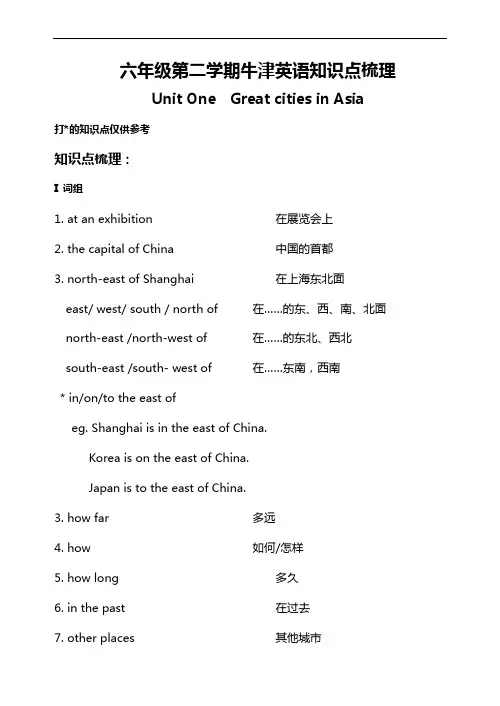
六年级第二学期牛津英语知识点梳理Unit One Great cities in Asia打*的知识点仅供参考知识点梳理:I 词组1. at an exhibition 在展览会上2. the capital of China 中国的首都3. north-east of Shanghai 在上海东北面east/ west/ south / north of 在……的东、西、南、北面north-east /north-west of 在……的东北、西北south-east /south- west of 在……东南,西南* in/on/to the east ofeg. Shanghai is in the east of China.Korea is on the east of China.Japan is to the east of China.3. how far 多远4. how 如何/怎样5. how long 多久6. in the past 在过去7. other places 其他城市8. from shanghai to Beijing 从上海到北京9. read some information about Beijing 阅读关于北京的信息10. the Great Wall 长城* the Summer Palace 颐和园* the Palace Museum 故宫博物院11. more than= over 超过* less than = under 少于12. 15 million people 一千五百万人*millions of, thousands of13. huge department store 大型百货公司*huge= very big14. spicy food 辣的食物15. in Asia 在亚洲16. great cities= big cities 大城市17. which city 哪个城市18. by plane=by air; 乘飞机by ship=by sea; 乘船by train/ ferry 乘火车/ 渡轮19. That’s right. 对的。
上海牛津英语六年级第二学期6B英语知识点汇总U1-U9[2]
![上海牛津英语六年级第二学期6B英语知识点汇总U1-U9[2]](https://uimg.taocdn.com/50c711bc0b1c59eef9c7b4cf.webp)
上海牛津英语六年级第二学期6B英语知识点汇总U1-U9(word版可编辑修改)编辑整理:尊敬的读者朋友们:这里是精品文档编辑中心,本文档内容是由我和我的同事精心编辑整理后发布的,发布之前我们对文中内容进行仔细校对,但是难免会有疏漏的地方,但是任然希望(上海牛津英语六年级第二学期6B英语知识点汇总U1-U9(word版可编辑修改))的内容能够给您的工作和学习带来便利。
同时也真诚的希望收到您的建议和反馈,这将是我们进步的源泉,前进的动力。
本文可编辑可修改,如果觉得对您有帮助请收藏以便随时查阅,最后祝您生活愉快业绩进步,以下为上海牛津英语六年级第二学期6B英语知识点汇总U1-U9(word版可编辑修改)的全部内容。
六年级第二学期牛津英语知识点梳理Unit One Great cities in Asia打*的知识点仅供参考知识点梳理:I 词组1. at an exhibition 在展览会上2. the capital of China 中国的首都3. north-east of Shanghai 在上海东北面east/ west/ south / north of 在……的东、西、南、北面north—east /north—west of 在……的东北、西北south—east /south- west of 在……东南,西南* in/on/to the east ofeg。
Shanghai is in the east of China.Korea is on the east of China。
Japan is to the east of China。
3. how far 多远4。
how 如何/怎样5. how long 多久6. in the past 在过去7. other places 其他城市8。
from shanghai to Beijing 从上海到北京9。
read some information about Beijing 阅读关于北京的信息10。
《牛津英语》6B 语法要点考题汇编(附答案)
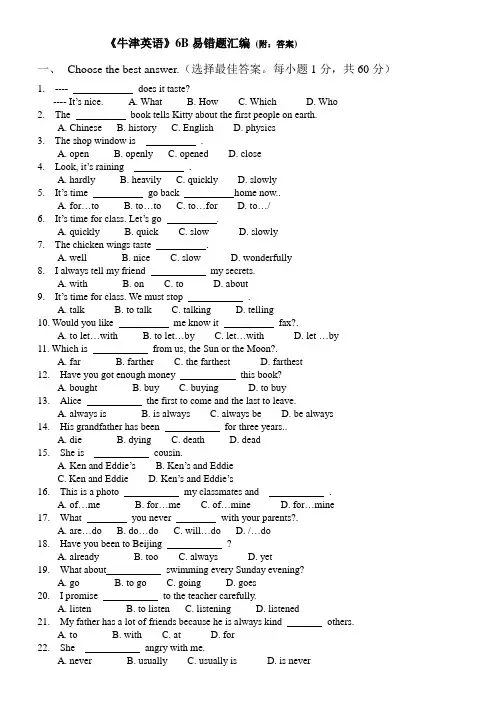
《牛津英语》6B易错题汇编(附:答案)一、Choose the best answer.(选择最佳答案。
每小题1分,共60分)1. ---- does it taste?---- It’s nice. A. What B. How C. Which D. Who2. The book tells Kitty about the first people on earth.A. ChineseB. historyC. EnglishD. physics3. The shop window is .A. openB. openlyC. openedD. close4. Look, it’s raining .A. hardlyB. heavilyC. quicklyD. slowly5. It’s time go back home now..A. for…toB. to…toC. to…forD. to…/6. It’s time for class. Let’s go .A. quicklyB. quickC. slowD. slowly7. The chicken wings taste .A. wellB. niceC. slowD. wonderfully8. I always tell my friend my secrets.A. withB. onC. toD. about9. It’s time for class. We must stop .A. talkB. to talkC. talkingD. telling10. Would you like me know it fax?.A. to let…withB. to let…byC. let…withD. let …by11. Which is from us, the Sun or the Moon?.A. farB. fartherC. the farthestD. farthest12. Have you got enough money this book?A. boughtB. buyC. buyingD. to buy13. Alice the first to come and the last to leave.A. always isB. is alwaysC. always beD. be always14. His grandfather has been for three years..A. dieB. dyingC. deathD. dead15. She is cousin.A. Ken and Eddie’sB. Ken’s and EddieC. Ken and EddieD. Ken’s and Eddie’s16. This is a photo my classmates and .A. of…meB. for…meC. of…mineD. for…mine17. What you never with your parents?.A. are…doB. do…doC. will…doD. /…do18. Have you been to Beijing ?A. alreadyB. tooC. alwaysD. yet19. What about swimming every Sunday evening?A. goB. to goC. goingD. goes20. I promise to the teacher carefully.A. listenB. to listenC. listeningD. listened21. My father has a lot of friends because he is always kind others.A. toB. withC. atD. for22. She angry with me.A. neverB. usuallyC. usually isD. is never23. I looked for my key everywhere, but couldn’t it.A. lookB. find outC. findD. found24. How are we going to get there?.A. toB./C. atD. in25. My sister usually spends many hours her homework .A. doB. doingC. to doD. does26. I’ll see you when I finish my housework.A. to doB. doingC. doD. did27. My family our holidays in Guangzhou last year.A. costB. tookC. spentD. paid28. I left for Beijing a cold morning .A. atB. onC. inD. for29. Because I was ill yesterday, I stayed at home.A. soB. forC. butD. /30. Open Day is the day parents visit the school.A. whoB. whichC. whenD. whose31. The train will leave at 8:00 a.m. tomorrow morning.A. /B. onC. atD. in32. I carefully but couldn’t anything.A. listened…heardB. listened…hearC. heard…listenD. heard…listened33. We can get by watching TV every day.A. informationsB. informationC. an informationD. a information34. Do you want to make any changes your programme?A. forB. onC. atD. to35 It will take you about an hour get to the airport .A. toB. onC. offD. in36. Let’s to the bus stop quickly.A. goesB. goingC. to goD. go37. I’d like to read books when I am the bus.A. onB. inC. atD. by38. How long do you spend computer games every day?.A. playB. playingC. playsD. to play39. We must not eat drink in the classroom.A. andB. withC. toD. or40. What does this sign ?A. meansB. meaningC. meanD. to mean41. We must not flowers in the park..A. pickB. pickingC. to pickD. pick up42. We must our classroom tidy and clean.A. keepB. letC. putD. clear43. We must follow all the rules us.A. betweenB. nearC. besideD. around44. I don’t like meat fishA. toB. inC. withD. into45. Vegetables in the market are usually than those in the supermarket.A. much cheaperB. more cheapC. the most cheapD. cheapest46. He made mistakes in his homework..A. a littleB. fewC. littleD. much47. delicious the sandwich with ham and tomatoes are!.A. WhatB. HowC. What aD. How a48. What does he need to help his mother with the housework?A. doB. to doC. doesD. doing49. Steak usually tastes with black pepper sauce.A. wellB. wonderfullyC. niceD. sour50. ----May I have coffee after dinner?-----Sure, but only .A. some…littleB. any…littleC. some…a littleD. any…a little51. Let’s go swimming, ?A. will youB. shall weC. do youD. do we52. Why not up your hand when you want to ask questions?A. putting B .to put C. put D. puts53. Lucy’s diet is less than Alice’s..A. healthyB. healthierC. unhealthierD. health54. I had bread jam breakfast this morning..A. of…forB. for…withC. with…forD. and…of55. They arrived the hotel very late..A. inB. onC. atD. to56. They any drink. They’ve got plenty of for the picnic..A. needn’t…itB. needn’t…themC. don’t need…itD. don’t need…them57. The child doesn’t have a healthy diet and is becoming .A. thin and thinB. thinner and thinnerC. thiner and thinerD. more and more thin58. Don’t forget off the lights before you leave your classroom..A. switchingB. to switchC. to switchingD. switch59. Mary’s mother is old, but Susan’s mother is .A. as old asB. much youngerC. as old as sheD. even older60. How much this pair of shoes?A. isB. amC. areD. be二、Rewrite the following sentences as required.(按要求改写句子。
牛津小学英语六年级6B知识点汇总
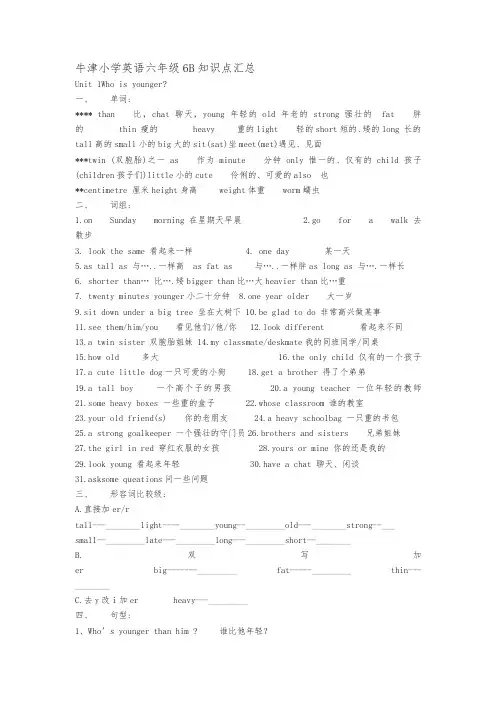
牛津小学英语六年级6B知识点汇总Unit 1Who is younger?一、单词:**** than 比,chat聊天,young年轻的old年老的strong 强壮的fat 胖的thin 瘦的heavy 重的light 轻的short短的、矮的long 长的tall高的small小的big大的sit(sat)坐meet(met)遇见、见面***twin (双胞胎)之一as 作为minute 分钟only惟一的、仅有的child孩子(children孩子们)little小的cute 伶俐的、可爱的also 也**centimetre 厘米height身高 weight体重worm蠕虫二、词组:1.on Sunday morning 在星期天早晨2.go for a walk 去散步3. look the same 看起来一样4. one day 某一天5.as tall as 与…..一样高as fat as 与…..一样胖as long as 与….一样长6. shorter than…比….矮bigger than比…大heavier than比…重7. twenty minutes younger小二十分钟 8.one year older 大一岁9.sit down under a big tree 坐在大树下 10.be glad to do 非常高兴做某事11.see them/him/you 看见他们/他/你 12.look different 看起来不同13.a twin sister 双胞胎姐妹 14.my classmate/deskmate我的同班同学/同桌15.how old 多大16.the only child 仅有的一个孩子17.a cute little dog一只可爱的小狗 18.get a brother 得了个弟弟19.a tall boy 一个高个子的男孩 20.a young teacher 一位年轻的教师21.some heavy boxes 一些重的盒子 22.whose classroom 谁的教室23.your old friend(s) 你的老朋友 24.a heavy schoolbag 一只重的书包25.a strong goalkeeper 一个强壮的守门员26.brothers and sisters 兄弟姐妹27.the girl in red 穿红衣服的女孩 28.yours or mine 你的还是我的29.look young 看起来年轻 30.have a chat 聊天、闲谈31.asksome queations问一些问题三、形容词比较级:A.直接加er/rtall---________light----________young--_________old---________strong--___ small--_________late---_________long---_________short--________B.双写加er big-------_________ fat-----_________ thin---________C.去y改i加er heavy---_________四、句型:1、Who’s younger than him ?谁比他年轻?My brother is younger than him . 我弟弟比他年轻。
牛津小学英语6B▲必背词汇、短语、句型_2
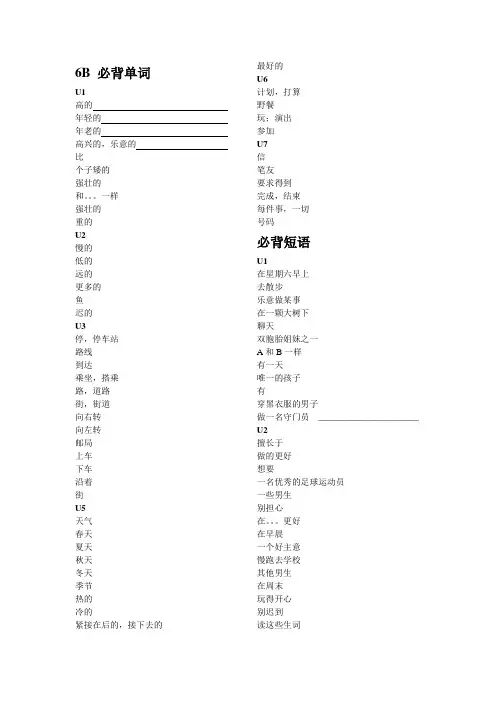
6B 必背单词U1高的年轻的年老的高兴的,乐意的比_________________________________ 个子矮的___________________________ 强壮的_____________________________ 和。
一样_________________________ 强壮的_____________________________ 重的_______________________________ U2慢的_______________________________ 低的_______________________________ 远的_______________________________ 更多的_____________________________ 鱼_________________________________ 迟的_______________________________ U3停,停车站_________________________ 路线______________________________ 到达_______________________________ 乘坐,搭乘_________________________ 路,道路___________________________ 街,街道___________________________ 向右转_____________________________ 向左转_____________________________ 邮局_______________________________ 上车_______________________________ 下车_______________________________ 沿着_______________________________ 街_________________________________ U5天气_______________________________ 春天_______________________________ 夏天_______________________________ 秋天_______________________________ 冬天_______________________________ 季节_______________________________ 热的_______________________________ 冷的_______________________________ 紧接在后的,接下去的_______________ 最好的____________________________U6计划,打算________________________野餐______________________________ 玩;演出__________________________参加______________________________U7信________________________________笔友______________________________要求得到__________________________完成,结束________________________每件事,一切______________________号码______________________________ 必背短语U1在星期六早上_________________________ 去散步_______________________________ 乐意做某事___________________________ 在一颗大树下_________________________ 聊天_________________________________ 双胞胎姐妹之一_______________________ A和B一样___________________________ 有一天_______________________________ 唯一的孩子___________________________ 有___________________________________ 穿黑衣服的男子_______________________ 做一名守门员_________________________ U2擅长于_______________________________ 做的更好_____________________________ 想要_________________________________ 一名优秀的足球运动员_________________ 一些男生_____________________________ 别担心_______________________________ 在。
【小学 六年级英语】牛津小学英语3A--6B语法总结 共(3页)
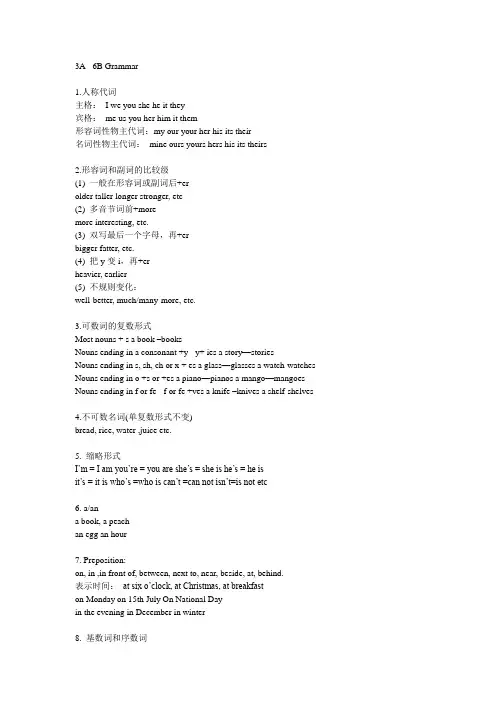
3A - 6B Grammar1.人称代词主格:I we you she he it they宾格:me us you her him it them形容词性物主代词:my our your her his its their名词性物主代词:mine ours yours hers his its theirs2.形容词和副词的比较级(1) 一般在形容词或副词后+erolder taller longer stronger, etc(2) 多音节词前+moremore interesting, etc.(3) 双写最后一个字母,再+erbigger fatter, etc.(4) 把y变i,再+erheavier, earlier(5) 不规则变化:well-better, much/many-more, etc.3.可数词的复数形式Most nouns + s a book –booksNouns ending in a consonant +y - y+ ies a story—storiesNouns ending in s, sh, ch or x + es a glass—glasses a watch-watches Nouns ending in o +s or +es a piano—pianos a mango—mangoes Nouns ending in f or fe - f or fe +ves a knife –knives a shelf-shelves4.不可数名词(单复数形式不变)bread, rice, water ,juice etc.5. 缩略形式I’m = I am you’re = you are she’s = she is he’s = he isit’s = it is who’s =who is can’t =can not isn’t=is not etc6. a/ana book, a peachan egg an hour7. Preposition:on, in ,in front of, between, next to, near, beside, at, behind.表示时间:at six o’clock, at Christmas, at breakfaston Monday on 15th July On National Dayin the evening in December in winter8. 基数词和序数词one – first two-second twenty-twentieth9. Some /anyI have some toys in my bedroom.Do you have any brothers or sisters?10. be 动词(1) Basic form: am/are/is(2) 肯定和否定句I am(not) from London.My eyes are(not) small.My hair is(not) long.(3)一般疑问句:Am I a Chniese? Yes, you are. No, you aren’t.Are they American? Yes, they are. No, they aren’t.Is the cat fat? Yes, it is. No, it isn’t.11. there be 结构肯定句:There is a …There are …一般疑问句:Is there …? Yes, there is./ No, there isn’t.Are there…? Yes, there are. /No, there aren’t.否定句:There isn’t …. There aren’t….12. 祈使句Sit down pleaseDon’t sit down, please.13. 现在进行时.通常用“now”.形式:be + verb +ingeg: I am(not) doing my homework.You/We/They are(not) reading.He/She/It is(not) eating.动词—ing 的形式Most verbs +ing walk—walkingVerbs ending in e -e + ing come—comingShort verbs ending in a vowel + a consonant run –running swim—swimming14 一般现在时。
牛津小学英语六年级英语6B语法汇总
6B语法汇总两个音节以内形容词比较级的构成方式:1.一般在单词的结尾加“-er”,例如:tall – taller young – younger 2.以e结尾的单词,结尾加“-r”,例如:wide – wider3.结尾是重读闭音节,而且结尾只有一个辅音时,双写这个辅音再加“-er”,例如:big – bigger, hot – hotter4.结尾是辅音加y时,则将y改为i,再加“-er”,例如:heavy –heavier 不规则的形容词比较级:good – better many / much – more bad – worse形容词比较级句型的用法:用于两者比较的句子中,常与介词than连用。
句式:名词(人称代词主格) be 形容词比较级 than名词(人称代词宾格)陈述肯定句: Su Yang is younger than Su Hai.否定句:Su Yang isn’t younger than Su Hai.一般疑问句: Is Su Yang younger than Su Hai?特殊疑问句: Who is younger than Su Hai?两者的同级比较(as … as 结构)句式:名词(人称代词主格)be as 形容词原级 as名词(人称代词宾格)陈述肯定句: Su Yang is as young as Su Hai.否定句:Su Yang isn’t as young as Su Hai.一般疑问句: Is Su Yang as young as Su Hai?特殊疑问句: Who is as young as Su Hai?两个音节以内副词比较级构成方式(参照形容词比较级构成方式)不规则的副词比较级:well – better far – farther副词比较级句型的用法:句式:句式:名词(人称代词主格)行为动词副词比较级 than名词(人称代词宾格)例1陈述肯定句: I jump higher than Liu Tao.否定句:I don’t jump higher than Liu Tao.一般疑问句: Do you jump higher than Liu Tao?特殊疑问句: Who jumps higher than Liu Tao?例2陈述肯定句: Liu Tao runs faster than me.否定句:Liu Tao doesn’t run faster than me.一般疑问句: Does Liu Tao run faster than you?特殊疑问句: Who runs faster than you?be going to (do sth.) 打算做某事1)表示现在的意图,即打算在最近或将来进行某事,例如:We are going to post the letter.2)表示现在已有迹象表明将要发生或即将发生某种事态,例如:I must hurry, I’m going to be late.(常与tomorrow, next week, next year等将来时间连用)用法:陈述肯定句:We are going to give a puppet show next week.否定句:We aren’t going to give a puppet show next week.一般疑问句:Are you going to give a puppet show next week? 特殊疑问句:Who is going to give a puppet show next week?What are you going to do next week?。
上海版牛津英语六年级下册6B重点知识点复习整理
上海版牛津英语六年级下册6B重点知识点复习整理上海版牛津英语六年级下册6B 重点知识点复习整理Module 1 Cjty LjfeUnit 1 Great CitieS in ASia【知识点梳理】1. 方位词: east / WeSt / north / south / no rth-east / no rth-west / SoUth-east / SoUth-WeSt 用法:a.两地不相邻:e.g. A is north B. ( = to the SoUth Of )b. 两地接壤:e.g. A is on the north of B.c. 所属关系,A 包含 B, B 属于 A: e.g. B is in the north of A.2. by +交通工具表示“乘,,交通工具”,用how 进行提问e.g. by bus / ferry / train / ShiP / Un dergro Und by pla ne = by air,??by ShiP = by Sea3. How far …多远(询问距离的远近,路程的长短)e.g. Hoe far is it from your home to school? 从你家至 U 学校有多远?4. How Iong …多长,多久(询问时间的长短,提问一段时间)e.g. How Iong does it take to travel from Shan ghai to Beiji ng by train? 坐火车从上海至 U 北京要花多长时间?5. It takes (sb.) some time to do sth.做某事需要花费多少时间e.g. It takes me five hours to make this modal plane. 做这个模型飞机花了我5 个小时。
6. like / love / enjoy doi ng sth. 喜欢做某事e.g. The people in Ban gkok like / love / enjoy eat ing SPiCy food. 曼谷人喜欢吃辛辣食物。
(完整版)牛津英语6B期中复习词汇与语法
6B期中复习词汇与语法Unit 1 Great cities in Asia) 1。
It’s _________ walk from my home to that school。
A. fifteen minuteB. fifteen minute’s C。
fifteen minutes D。
fifteen minutes’() 2. It takes her brother 2 hours _________ TV every night。
A。
watch B。
watches C。
watching D. to watch( )3. -_________ does it take him to fly to Hong Kong?—About two hours.A. How manyB. How longC. How muchD. How far() 4。
They are leaving Italy _________ America _________ plane。
A. for, byB. to, onC. in, atD. at, by() 5. —_________ is it from your home to the subway station?—About 5,000 metres.A. How far B。
How long C。
How old D. How often( ) 6。
There are a lot of great _________ in Asia like Shanghai。
A. cityB. cities C。
countries D. country()7。
Beijing is _________ of Shanghai。
A. east B。
south C. west D。
north()8. Japan is _________ the east of China and _________ the east of Asia.A. in, inB. in, to C。
牛津译林版六年级英语下册6B U1-U3单元重点知识总结
6B U1-U3单元重点知识总结Unit 1 Cinderella一、单词。
prince王子 because因为 before 在…以前 late迟的,晚的fairy 仙女 clothes 衣服 fit合适,合身 pick 摘,拾why 为什么 let让 mushroom 蘑菇 understand明白,理解二、词组。
1. at the prince’s house -在王子家2. come and help me -过来帮助我3. my gloves /trousers/T-shirt -我的手套/裤子/T恤衫4. go to the party -去参加聚会5. put on -穿上(衣服)6. try on -试穿7. take off -脱下8. be bad for… -对…有害9. take it off -脱下它10. put them on -穿上它们11. try on the shoe -试穿这只鞋12. try them on -试穿它们13. come back before 12 o’clock-十二点之前回来14. be sad /happy -伤心/开心15. have a good/great time -玩得开心16. at the party -在聚会上17. have to do sth. -不得不做某事18. have to come home -不得不回家19. visit every house -拜访每一户20. fit sb well -很适合某人21. at 12 o’clock -在十二点22. put on the English play -表演(演出)这个英语剧23. have a drink -喝饮料24. draw a dress for her friend -为她的朋友画一件连衣裙25. read stories -读故事26. have some snacks -有一些零食27. at a snack bar -在零食店28. thirsty and hungry Bobby -饥渴交加的波比29. in the forest -在森林里30. find some mushrooms -发现一些蘑菇31. under the tree -在树下32. pick a big red mushroom -摘了一个又大又红的蘑菇33. pick up the book =pick the book up-捡起这本书34. pick them up -把它们捡起来35. leave a shoe behind -把一只鞋子留下了36. don’t understand why -不明白为什么37. foot hurts -脚疼38. be bad /good for… -对…有坏处/好处39. have to -不得不,必须40. leave…behind -留下;丢下41. have some nice clothes and shoes -有些漂亮衣服和鞋子42. don’t have any nice clothes or shoes -没有漂亮衣服和鞋子43. put on the new clothes= put the new clothes on-穿上新衣服44. take off his white jacket=take his white jacket off -脱下他白色的夹克衫三、句型。
- 1、下载文档前请自行甄别文档内容的完整性,平台不提供额外的编辑、内容补充、找答案等附加服务。
- 2、"仅部分预览"的文档,不可在线预览部分如存在完整性等问题,可反馈申请退款(可完整预览的文档不适用该条件!)。
- 3、如文档侵犯您的权益,请联系客服反馈,我们会尽快为您处理(人工客服工作时间:9:00-18:30)。
6B语法汇总
两个音节以内形容词比较级的构成方式:
1.一般在单词的结尾加“-er”,例如:tall – taller young – younger 2.以e结尾的单词,结尾加“-r”,例如:wide – wider
3.结尾是重读闭音节,而且结尾只有一个辅音时,双写这个辅音再加“-er”,例如:big – bigger, hot – hotter
4.结尾是辅音加y时,则将y改为i,再加“-er”,例如:heavy –heavier 不规则的形容词比较级:
good – better many / much – more bad – worse
形容词比较级句型的用法:
用于两者比较的句子中,常与介词than连用。
句式:名词(人称代词主格) be 形容词比较级 than名词(人称代词宾格)陈述肯定句: Su Yang is younger than Su Hai.
否定句:Su Yang isn’t younger than Su Hai.
一般疑问句: Is Su Yang younger than Su Hai?
特殊疑问句: Who is younger than Su Hai?
两者的同级比较(as … as 结构)
句式:名词(人称代词主格)be as 形容词原级 as名词(人称代词宾格)
陈述肯定句: Su Yang is as young as Su Hai.
否定句:Su Yang isn’t as young as Su Hai.
一般疑问句: Is Su Yang as young as Su Hai?
特殊疑问句: Who is as young as Su Hai?
两个音节以内副词比较级构成方式(参照形容词比较级构成方式)
不规则的副词比较级:
well – better far – farther
副词比较级句型的用法:
句式:句式:名词(人称代词主格)行为动词副词比较级 than名词(人称代词宾格)
例1
陈述肯定句: I jump higher than Liu Tao.
否定句:I don’t jump higher than Liu Tao.
一般疑问句: Do you jump higher than Liu Tao?
特殊疑问句: Who jumps higher than Liu Tao?
例2
陈述肯定句: Liu Tao runs faster than me.
否定句:Liu Tao doesn’t run faster than me.
一般疑问句: Does Liu Tao run faster than you?
特殊疑问句: Who runs faster than you?
be going to (do sth.) 打算做某事
1)表示现在的意图,即打算在最近或将来进行某事,例如:We are going to post the letter.
2)表示现在已有迹象表明将要发生或即将发生某种事态,例如:
I must hurry, I’m going to be late.
(常与tomorrow, next week, next year等将来时间连用)
用法:
陈述肯定句:We are going to give a puppet show next week.
否定句:We aren’t going to give a puppet show next week.一般疑问句:Are you going to give a puppet show next week? 特殊疑问句:Who is going to give a puppet show next week?
What are you going to do next week?。
